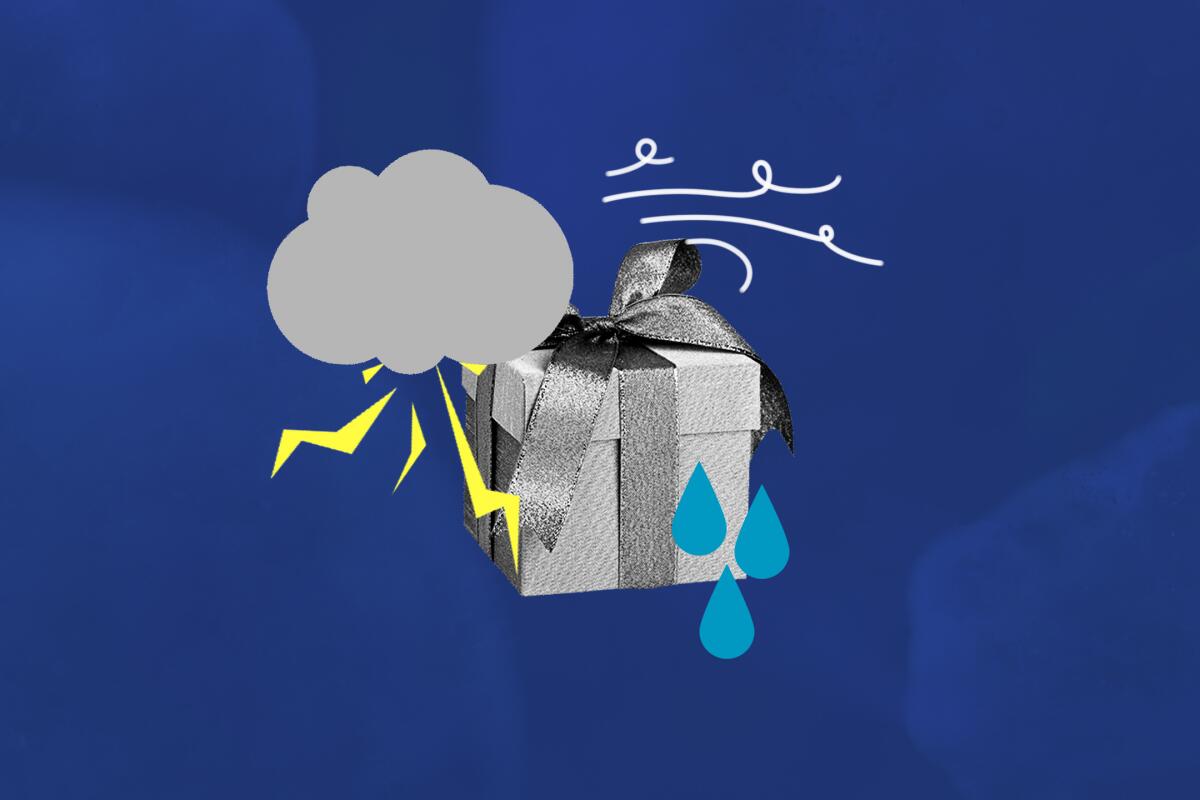Everyone is stressed and anxious this holiday season. 7 ways to cope

- Share via
The holidays can be overwhelming any year, but this pandemic season the stark contrast between the joyful scenes we see playing out in Hallmark Channel movies and the loss, isolation and financial hardship many are experiencing in real life will be especially painful.
Although there’s no way to have the holiday we’re used to having — Thanksgiving was proof of that — there are ways to reframe and reimagine this year’s celebrations and breathe through overwhelming feelings.
Featuring our favorite tales of searching for love in Southern California, curated from the beloved L.A. Affairs column.
We asked experts in mental health and calmness for their tips on coping this holiday season. Try out a few to see whether they bring more peace in the days and weeks ahead.
1. Name it to tame it
One of the biggest obstacles to happiness this holiday season will be unmet expectations and the related emotions that bubble up.
“People need to assess their expectations over the holidays and have a reset,” says Sage Grazer, psychotherapist and cofounder of Frame, a therapist matching tool, which offers free streaming online discussions each week where you can confidentially ask a therapist questions about such topics as managing holiday stress and sadness.
Welcome to our comprehensive gift guide for the 2020 holiday season.
Take a look at the traditions you aren’t getting to experience this year (such as gathering with friends and family, buying gifts for everyone or taking in holiday shows) and write in a journal or talk with a therapist about the guilt, shame, sadness or anxiety you’re feeling about it.
Most people tend to push unpleasant feelings aside in the name of good cheer, but Grazer says it’s important for people to process their feelings, so they don’t manifest in self-destructive actions.
2. Start with gratitude
Remind yourself it’s temporary and count blessings where you can. Once you know what you’re feeling and why, remind yourself the situation isn’t forever. It’s common when you have overwhelming feelings to catastrophize and engage in all-or-nothing thinking.
I was obviously smitten, but he — recently divorced and emerging from a series of unsatisfactory relationships — did not seem to want anything more than to be friends.
“I feel like the holidays have been canceled…. My kids might be too old for this next year.”
Question this thinking when it pops up and know that you’re not abandoning your holiday traditions forever; you’re just setting some rituals aside for 2020.
There has never been a better time to start a gratitude journal, says meditation teacher Ashley Wray, founder of the Mala Collective. Starting your morning by listing at least three things you’re grateful for is a science-backed way to shift your mindset for the day.
3. Make new traditions
Sure, there are a lot of things you can’t do this year. But instead of focusing on the limitations, focus on alternatives that might help you find joy or meaning.
Instead of ice skating, you might take up hiking and take in Los Angeles’ beautiful views. Rather than shopping with your mom, focus on baking or doing crafts together over a video call. Instead of volunteering in person, donate to a local food bank, write letters and cards to those in need, or send comfort food care packages to deployed military personnel.
4. Focus on what you can do
Drive around local neighborhoods with a to-go mug of hot chocolate and take in the lights and decorations, or simply decorate your home differently.
Host a virtual holiday movie night with friends and share funny running commentary via a group text. Adopt Zoom or FaceTime game nights with games that adapt well to video chat, such as Yahtzee or Pictionary.
5. Build movement into every day
No one ever said, “I regret taking that walk.” Well, few people anyway. Taking a walk outdoors every morning is a great way to boost your mood and help you sleep better at night, which in turn will help stabilize your emotions. Similarly, breathing through inverted yoga poses such as downward dog can elevate your mood, said Christopher Key Chapple, head of the yoga studies program at Loyola Marymount University.
New research shows that weight training might also ease anxiety. So make exercise a part of your daily self-care routine.
6. Use breathwork to surf through your feelings
“Any time we can focus on something other than our crazy thoughts, it helps us to get more centered in our body and more relaxed in general,” said breathwork coach Jay Bradley, owner of Breathe On It, which offers guided breathwork sessions via Zoom. Bradley recommends a couple of breathing techniques to use in moments when emotions feel overwhelming.
One is simple resonant breathing, which involves inhaling and exhaling only through the nose for equal counts of four. Another method is box breathing, which requires a little more concentration but can better take you out of your head when you’re ruminating. It involves inhaling through the nose for a count of four, imagining the breath coming up from the base of your spine to the top of your head, holding the breath for four counts, exhaling for four and holding the exhale for another four before repeating.
“Even three or four minutes” of this conscious breathing, Bradley said, “can shift your state.”
7. Visualize happy memories of holidays past
Although it might sound painful, “this yoga skill of sensory imaginative engagement can be quite healing,” Chapple said.
That’s because it can remind you of how lucky you are to have had some of these experiences and alert you to what traditions are worth taking back up in 2021 and which ones are better left in the rearview mirror.
More to Read
Sign up for The Wild
We’ll help you find the best places to hike, bike and run, as well as the perfect silent spots for meditation and yoga.
You may occasionally receive promotional content from the Los Angeles Times.













